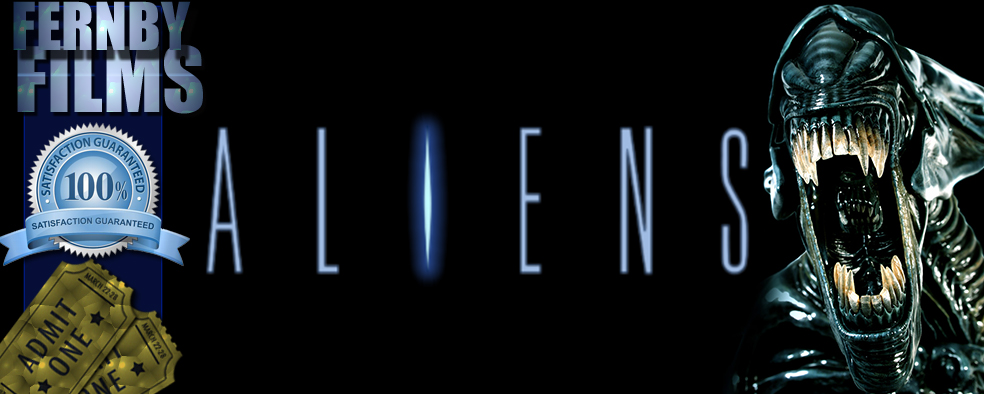Movie Review – Aliens (Directors Cut)
Amped up sequel to Alien, James Cameron’s defining blockbuster opus still holds up as a modern masterpiece in science fiction terror. With a careful build-up and a slow burn tension permeating the film’s opening act, once the aliens attack and the action starts, it never lets up. Bold, astoundingly well made, and utterly compelling, Aliens will probably remain the best of Cameron’s early works.
– Summary –
Director : James Cameron
Year Of Release : 1986
Principal Cast : Sigourney Weaver, Michael Biehn, Lance Henricksen, Bill Paxton, Carrie Henn, Paul Reiser, William Hope, Al Matthews, Mark Rolston, Jenette Goldstein
Awards : Academy Awards – Best Sound Effects Editing, Best Visual Effects, BAFTA’s – Best Visual Effects, Saturn Awards – Best Sci-Fi Film, Best Actress – Sigourney Weaver, Best Supporting Actor-Bill Paxton, Best Supporting Actress – Jenette Goldstein, Best Performance by A Young Actor-Carrie Henn, Best Director-James Cameron, Best Writing, Best Special Effects.
Approx Running Time : 155 Minutes
Aspect Ratio : 1.85:1
Synopsis: When she’s seconded to return to the planet original encountered in Alien, as a consultant to a group of Marines, Ripley is again embroiled in a battle for survival with the deadly alien creatures unleashed upon them.
What we think : Amped up sequel to Alien, James Cameron’s defining blockbuster opus still holds up as a modern masterpiece in science fiction terror. With a careful build-up and a slow burn tension permeating the film’s opening act, once the aliens attack and the action starts, it never lets up. Bold, astoundingly well made, and utterly compelling, Aliens will probably remain the best of Cameron’s early works.
**********************
This review is based on the extended Director’s Cut version of Aliens, long thought by fans to be the definitive version of the film. Key story elements removed for the theatrical version, such as setting up the LV426 colony at the opening of the film, additional character development for Ripley during the opening act and various other narrative enhancers throughout which add to the story.
If it was possible to exceed what Ridley Scott did with Alien, then James Cameron did so with Aliens. In what can only be described as a tour de force of science fiction, James Cameron cemented his place as a genuine A-list director, following his breakout mainstream debut with Terminator, with the follow-up to Alien. Set some time after the events in Alien, with Ellen Ripley being found drifting in the remains of the Nostromo’s escape pod, some 52 years after she blew the Alien Queen out the door, Aliens manages to return our heroine to the planet she never wanted to return to. Aliens is not your typical action-sci-fi fare, however, in that it takes its time setting up the scenario, the characters, and the plot. Avoiding Ridley Scott’s original noir-ish tone from film 1, Cameron eschews the more traditional scary movie feel for a gung-ho, testosterone injected thrill ride, balancing both character development and hard-core thrills in equal measure. To say Aliens is a masterpiece is an understatement of an order of magnitude. What Cameron achieved set the benchmark for science fiction (and the Alien franchise) film and, until he revised that benchmark again in Terminator 2, would never be bettered.
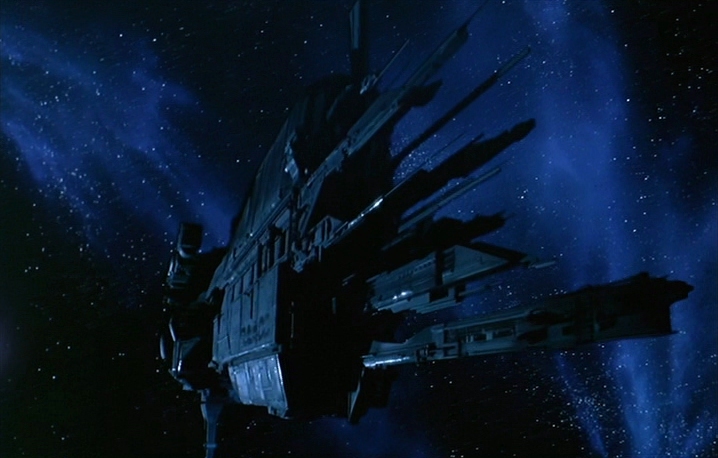
When she is found drifting through space by another ship, asleep in cryo-stasis, Ellen Ripley is swiftly returned to Earth for interrogation by company officials, as to what occurred on the Nostromo many years before. Finding herself dismissed as a lunatic for her detailed and often unbelievable story, Ripley must try rebuilding her life when it is revealed that her only child, a daughter, has died in the years she’s been away. Company man Burke, a man whose agenda is not immediately clear, tries to persuade Ripley to return to the planet they discovered the alien, LV426, with a group of marines, to find out what has happened to a colony set up there. It seems the colony has suddenly gone quiet, and the Company, with vested interests in terraforming the world into a habitable planet, is interested to know why. Ripley, initially reluctant, suffers from recurring nightmares about her time aboard the Nostromo and the alien, and after one particularly bad night, agrees to tag along as a consultant. Much later, when the Marines spacecraft has arrived at LV426, Ripley and the Marines travel to the surface to investigate the now silent colony. Upon landing, they soon discover that all the colonists have been encased by some kind of crystalline structure, almost like bees wax, in an underground part of the complex. Before you can say “I can see dead people”, the Marines are soon attacked by a horde of alien creatures, decimating their numbers and reducing their fire-power to a substantially limited quantity. Not only that, but the nuclear reactor in the complex is now in an unavoidable meltdown, the explosion of which is inescapable save for piloting another drop-ship from the orbiting man craft above. Ripley, as the only one who’s actually encountered the alien creatures before, must use all her ingenuity and knowledge to once again fight to save herself, but also a young colonist girl, Newt, from certain death.
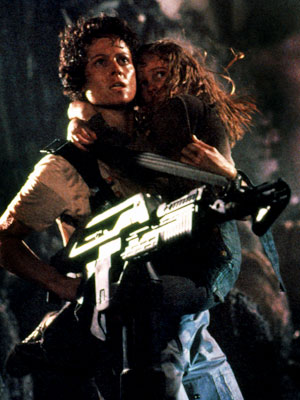
Fresh from the low-budget success of Terminator, 20th Century Fox was looking to somehow capitalize on the success of Alien, and looked to the up-and-coming director to give them an answer. It’s fair to say that Cameron, in a word, succeeded. Taking the characters and ideas of the previous film, wrapping in a militaristic sub-theme and plenty of guns, alongside the psychotherapy narrative of a post-traumatic stressed Ripley, and some (for their time) state-of-the-art effects, James Cameron delivers a taut, muscular and grungy story of redemption, action and sarcasm; a film laced with the 80’s “greed is good” mantra and the dingy, post-Star Wars decayed science fiction standard. The story, which takes over an hour to get to the first true alien sighting, is predominantly a character piece. Ripley is, unlike in Scotts film, the lead here, her garrulous personality and brutish (often arrogant) behavior a constant irritant to the marine soldiers she accompanies. Like its predecessor, Aliens relies upon the tension between the human characters in relation to their perilous situation to build both suspense but emotional weight. The added bonus story arc of Ripley’s quest to replace her now-deceased daughter with an orphan girl from the colony, Newt, gives even more realism and a definite human quality to what could have simply been a slam-bang action-fest.
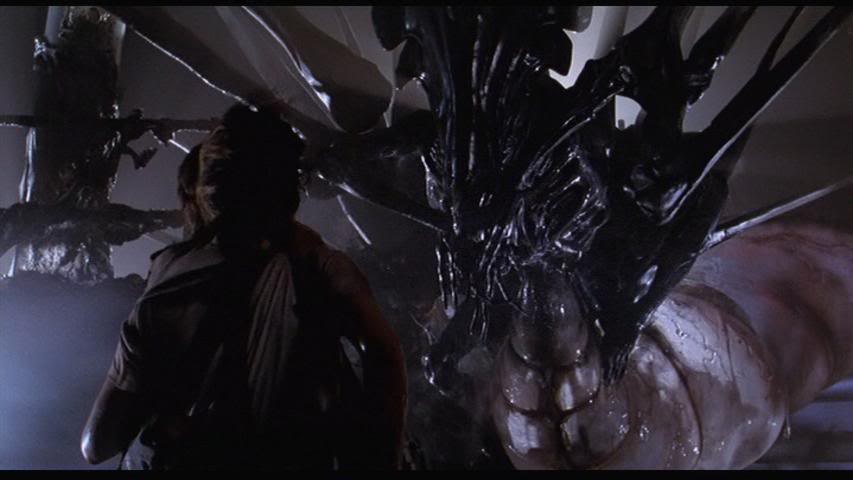
Aside from Ripley, the cast is populated with some great character work, probably the most iconic of which is Bill Paxton’s Hudson. Hudson is the cocky, self-assured Private who quickly crumbles when faced with impossible odds: his rapid degeneration from Marine to frightened, screaming human is probably the most enduring legacy of the entire film. Alongside Paxton is fellow Cameron alum Michael Biehn, who worked with the director on The Terminator, as the quietly spoken, yet resolute Corporal Hicks, a man who find he’s got some chemistry with Ripley after many of their team are killed. It’s the “love out of death” syndrome, but Cameron never overstates it with overt eye-fluttering and flirting. At least, not in the traditional way: Hicks’ idea of flirting is to teach Ripley how to use one of the Marine’s machine guns. Also along for the ride are Mark Rolston (later seen as the vile prisoner Boggs in The Shawshank Redemption) and Jenette Goldstein (who would appear in T2: Judgement Day as John Connor’s foster mother, as well as Titanic as an Irish mother with two children) as Private Drake and Vasquez respectively. Drake and Vasquez are the door-busters of the squad; they carry the biggest guns and have the biggest balls. Vasquez, especially, prefers to deal with her latent fear by confronting it, rather than running. William Hope plays Lt Gorman, the ranking officer in charge of the Marine squad, whose inability to control the situation that unfolds soon has him curled up in a fetal position in the corner. Gorman quickly comes to the realization that he’s not cut out for being in charge, and redeems himself as a half-decent recruit in battle.
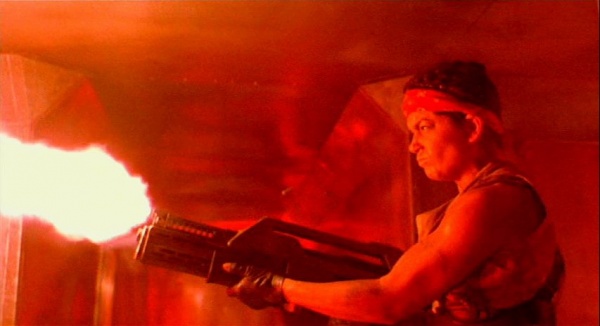
Chief villain of the piece is slimy, underhanded Company executive Burke, played with sweaty relish by Paul Reiser (from TV’s Mad About You) and given just the right tinge of jaw-dropping badness to make his character not only evil, but completely reprehensible. Reiser is really, really good in the role, a memorable villain even if not the most theatrical. Standing proudly in the character of annoying child character is Carrie Henn, as Newt, the softly spoken colony orphan who suffers post traumatic stress, and is quickly “adopted” by Ripley. Henn is cute enough, I suppose, but her limited acting ability becomes frustratingly inadequate as the film progresses. She has a number of key scenes with Weaver, and although these moments are quite tender and emotional, Weaver’s doing all the work to make it work. James Cameron’s choice of Henn as the key to the film’s emotional core is, on reflection, as limiting as casting Edward Furlong as John Connor in T2. Both child actors were unable to perform to the level Cameron’s scripts demanded, although it must be said Furlong fares better than Henn, due mainly to Cameron’s insertion of modern dialogue and 90’s buzzwords, neatly sidestepping any real scripting, in T2. Newt is the arc around which Ripley builds her character, so you’d think a more competent actress may have been found. Still, I guess there are only so many Dakota Fanning’s to go around.
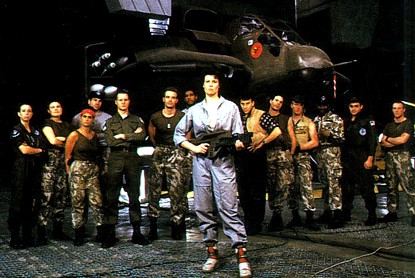
If there’s any real carry-over from Ridley Scott’s Alien in this film, it’s Cameron’s coup de grace of having another android in the mix. Ian Holm’s android villain from Alien is paralleled here, with Bishop, played by Lance Henricksen. Bishop, however, isn’t programmed to be evil, as he tries to convince Ripley early on. Ripley, however, whose trust in artificial life-forms was betrayed in Alien, is intent on portraying Bishop as a bad guy, regardless of how he acts. This dynamism is a really classy addition into the franchise, mainly because the Bishop character would be used in numerous other Alien iterations, including the first Alien vs Predator film.
Where Cameron improves upon the first film is in his ability to enhance the original ideas and expand upon them. We’re given more information on the alien creatures, as they follow an egg-to-maturity timeline, as well as something of a societal structure, with the Queen (revealed by one of the film’s most plot-twisting lines: “so who’s laying all these eggs?”) controlling her “soldier” aliens as they attack the humans. Cameron eschews the original films’ refusal to show you the complete alien creature only in the final act here, with the Ripley’s discovery of the alien “hatchery” and the Queen. Otherwise, Cameron gives us glimpses, shadowy flickers of alien life, hidden by glorious red and blue lighting. Utilizing only a small number of “alien” puppets, Cameron tricks up into thinking he’s managed to create an entire army of the vicious killing machines; highlighted by the use of an upgraded motion sensing device (another riff on a concept used in Alien) which beeps menacingly whenever non-human life is present. It’s this increasing sense of dread, that the number of aliens is too high to combat, that creates the tension throughout the early part of the film, especially in the scenes set inside the colony base. In retrospect, it’s easy to see that Aliens plays out like a violent video game, the set looking like a cross between the world of Halo or Crysis, with alien creatures jumping out at every moment, while humans carrying advanced weaponry try desperately to reach their end zone and survive. While each member of the cast gets picked off one by one, the war of attrition makes its presence felt on the viewer as well. We’re drawn into this machismo world, this “tactics and battle fatigue” nightmare from which Ripley herself seems incapable of escaping. The story isn’t especially intellectual, but it does make the most of its elemental, primal moments. The basic human emotion of fear is hyped up to astonishing levels throughout, with Cameron relying on almost every trick in the book to keep us jumping in our seats.
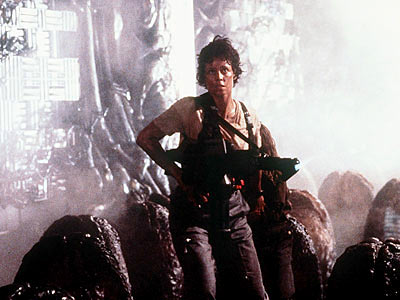
On a production level, Aliens still manages to look the goods. It hasn’t dated at all, save for a few moments of rotoscoping towards the end with the escaping drop ship. Otherwise, the effects here are first class, and cast a sad indictment on the fact that even the CGI of today is still not quite as realistic as the real thing. With the majority of effects practically achieved, almost entirely within the camera frame on set at the time, Aliens just “feels” real, as it should. The intimacy and immediacy of the effects, the alien creatures and Cameron’s use of both lighting and editing to give a false impression of speed and ferocity, shock the audience almost every time, the adrenaline pumping as you watch. Depending on your tolerance for militaristic swagger and balls-out attitude, that is. The set design, filmed in Pinewood Studios in the UK, is a true reflection of Ridley Scott’s original edict to make the technology in these films old and worn, not the typical Star Trek sterilised version we’re more used to seeing. Rain, wind, blood and grime, all play a significant part in enhancing and complementing the sense of oppression we feel while watching. Editorially, Ray Lovejoy had the devils own time putting this film together. While the production problems on Aliens have become the stuff of cinema legend (or perhaps more fittingly, mythology), of particular note are two components that should have been given more time: editing and score. Lovejoy, who had worked on the Kubrick films 2001: A Space Odyssey and The Shining, and who would go on to edit Tim Burton’s seminal comic-book film Batman, and even later still the film version of Lost In Space, was under increasing pressure late in the production schedule to get the film locked. With a release date looming, and the film still in its shooting stage with around six weeks to go. Composer James Horner flew to England to compose the score, only to find he had barely a completed film to score for. With mounting pressure coming on an immovable release date, Horner had to score the film inside of a few weeks. According to testimony from many of the crew, Horner’s now-classic score for the final battle between Ripley and the Alien Queen was written overnight, a feat of incredible endurance from the composer.
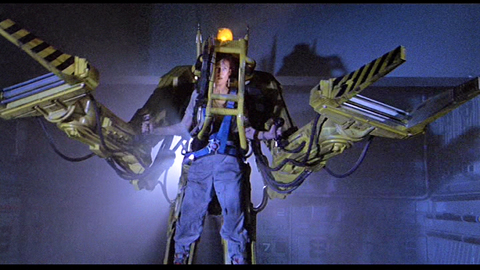
As I write this review, I am reminded of a moment a few years ago, when I had the pleasure of a trilogy screening of the Alien movies (at that point, Alien Resurrection hadn’t been made) at a local art-house cinema. At that stage, I’d seen Alien and Aliens more times than I could remember, and knew them intimately. But I’d only ever seen them on TV, on a small screen that limited their visceral impact considerably. After sitting through the low-key thrills of Alien, both myself and the friend I was with got chills the first time that Aliens‘ opening titles screeched onto the screen, in full surround sound. The music, the sound, the effects: if there’s a single film that deserves to be seen on the big screen instead of TV, then Aliens would be a contender for that title. Much like a Ben Hur or a Lawrence Of Arabia, there are certain films that are made for, and need to be seen on, the biggest screen possible. Watching Aliens for the first time on a cinema screen was incredible, a seminal moment for me, and I think I lost count of the things I noticed in it for the first time! If you ever get a chance to witness Cameron’s awesome vision on a cinema screen, then I cannot recommend the experience highly enough.
Aliens has long been considered one of the definitive sequels, a film which is superior to the one that spawned it. It’s definitely louder, longer and more intense. People often mistake intensity for “better” in terms of the complete cinema experience, but I tend to disagree. You need to look at the story first, characters second and all the effects and stuff afterwards. The story is definitely well written, tense and often unbearably thrilling. Cameron’s script took what made the first Alien film great and pumped it full of adrenaline and testosterone, and gave us Sigourney Weaver’s now iconic gun-toting characterization of Ellen Ripley. The characters in the film, for the most part, all serve a purpose in moving the story along, developing conflict and character within the narrative, and not a spare moment is wasted with superfluous dialogue. Aliens is sparse in terms of extravagance, with Cameron eschewing the frivolity he could afford on this film for a more raw, sweaty, muscular style of storytelling. A great story, continuing on from what’s come before but never subservient to it, nor destroying what we know in favor of cheap thrills, as well as characters we can embrace and empathize with, go most of the way to making Aliens a story with heart. The effects, music and explosions are merely the candy the rest is all wrapped up in.The “intensity” is underpinned by a great story first and foremost.
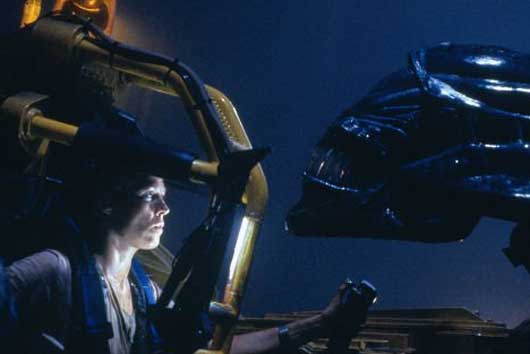
With the success of The Terminator and then Aliens, James Cameron cemented his popularity among cinema fans worldwide: and established himself as less a director of films, and moreso a director of events. His films are about the scale and grandeur, about giving audiences an experience in the cinema unlike anything they’ve experienced before. He’s put us inside and around the Titanic before it sank, he’s taken us to the deepest parts of our oceans in The Abyss, and he’s turned Arnold Schwarzenegger into a Super James Bond spy with True Lies. All are films that are best seen on the big screen. Aliens, probably even more than Terminator, is where we witness the birth of Cameron as an event director. As a thrill ride, it is still yet to be equaled in either the following franchise films, or in the sister Predator movies. As a movie experience, it’s brilliant.

